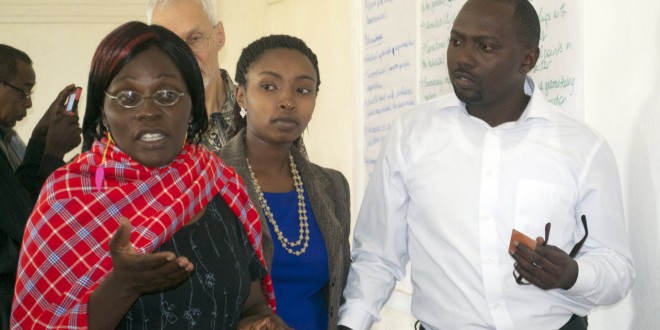Traditionally, religious practice, faith-based organisations and and sexual health and prevention education rarely meet. But, according to DSW’s Angela Mutegi, this is an out-date view of this relationship. Angela coordinates the communication activities of the Faith to Action project , which brings together faith communities that are committed to educating young people. Here, she tells us about the work of the project.
Angela, tell us a bit about the origin of the Faith to Action project. Where did it come from?
 Faith to Action is a project supported by the Ministry of Foreign Affairs of the Netherlands. The project is implemented by consortium of partners: Cordaid (Catholic Organisation for Relief and Development Aid), ACRL-RfP (African Council for Religious Leaders-Religions for Peace), Al-Azhar University, International Islamic Centre for Population Studies and Research, CCIH (Christian Connections for International Health) and MFCS (Muslim Family Counselling Services). DSW is acting as the Secretariat of the Network.
Faith to Action is a project supported by the Ministry of Foreign Affairs of the Netherlands. The project is implemented by consortium of partners: Cordaid (Catholic Organisation for Relief and Development Aid), ACRL-RfP (African Council for Religious Leaders-Religions for Peace), Al-Azhar University, International Islamic Centre for Population Studies and Research, CCIH (Christian Connections for International Health) and MFCS (Muslim Family Counselling Services). DSW is acting as the Secretariat of the Network.
The project’s central objective is to increase faith organisations (FOs)’ commitment to and provision of SRHR information to young people, access to commodities, services, and respect of rights. The project’s geographical focus is six countries; Burundi, Ethiopia, Ghana, Kenya, Rwanda, and Uganda.
Through implementing this project, it is aimed that the following outcomes will be achieved; (1) establish a global interfaith network which is coordinated as an effective platform for dialogue and advocacy on SRHR; (2) increased faith organisations’ participation and engagement in SRHR policy-making processes; (3) improve network members’ capacity to conduct advocacy and access to funds for SRHR and at the same time improve members’ knowledge of four distinct SRHR issues and; (4) generate and disseminate knowledge on FOs and SRHR.
What is your view on the project, how does your average day play out working with the Faith to Action network?
Faith to Action project is unique in the fact that it reaches out to faith organisations that have been in the past not well represented and their voices not heard in the issues of SRHR. We take a proactive lead in making sure that contributions by faith organizations are documented and there are evidence-based resources that communicate impact of faith organisations engagement in SRHR
My day to day activities entails communication with members, highlighting and making visible the success and contributions of faith organisations towards family health and wellbeing and providing a platform that offers faith organisations of diverse faith traditions a space to express their challenges and share. Also, the Kenya country office has recently launched a project ‘Faith for community wellbeing’ that focuses on enhancing community based maternal and child healthcare services using faith based approaches in Machakos and Garissa counties in Kenya, I therefore give some support to the project as well.
 Having worked on this for some years, in your view do traditionally minded people refuse sex education and contraception altogether?
Having worked on this for some years, in your view do traditionally minded people refuse sex education and contraception altogether?
Well it depends on how you define traditionally minded. I agree however, that there are divergent views among various groups of people on how sex education and issue of contraception should be conducted. These views range from issues of semantics to belief systems depending on the school of thought. These issues are informed by culture, education and religion among others. As such, the behaviour of each person towards sex education is unique.
I strongly believe that unwillingness to change is more of a social construct that has multifaceted determinants. Nevertheless, religious leaders and faith organisations are able to reach even the most conservative groups and provide the foundation for a set of common fundamental rights, including the right to reproductive health.
Angela, what would you consider are the major challenges you are facing when in touch with faith based organisations?
Faith to Action being interfaith in nature, deals with diverse faith traditions. Even within one faith, there are differing ideas and sets of values, beliefs and traditions. As a Network, we are called to allow these divergent ideas to contend and provide that platform that present these ideas to the general public and other key stakeholders. It goes without saying, that this is a delicate task that requires a lot of sensitivity.
Finally, in your experience do you see a difference between the responses of people of faith and of people with none when it comes to reproductive health and family planning?
I personally believe that there are irreligious people, but no one is in lack of faith. This already provides us with a common ground. There is, without a doubt, a growing recognition of the impact and influence of someone’s faith on reproductive health and we have in deed witnessed and demonstrated that faith organisations are often supportive of SRHR.
Still, the voices of faith organisation and religious leaders contribution to SRHR have often not been amplified and mostly overshadowed by the secularist mind-set where faith is seen as a ‘phenomenon of the past’. There is a need for a paradigm shift where we engage faith as partners as well as objectively and purposefully count their contribution.
Launch of new Network website: www.faithtoactionetwork.org
For more information on DSW and its work on sexual health and youth empowerment, visit www.dsw.org. Follow us on Twitter at @dsw_worldwide for daily updates on what is happening in Kenya, Germany and elsewhere in the field of global development and sexual health!



